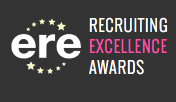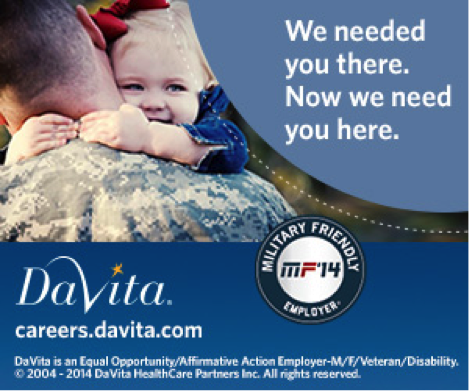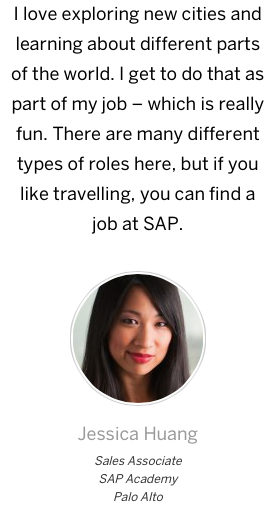 You’ve seen the first batch of winners of the ERE Recruiting Excellence Awards.
You’ve seen the first batch of winners of the ERE Recruiting Excellence Awards.
Those first categories announced were related to college recruiting; mobile recruiting; career sites; and referrals.
Now, onto the categories of military talent; technology; onboarding; and branding.
As I said last week, the info below is brief, with more in the months to come in the form of webinars, articles, and conference sessions.
I will say that one of the neatest things about these annual awards (besides the celebrations some of the winners have been telling me have been going on in their workplaces) is finding the hidden gems. Below, you’ll read about a large grocery chain whose talent-management practices, before this, you likely knew little about.
 The Military Talent Program award, a quite competitive category, goes to DaVita Kidney Care, which has hired more than 2,000 veterans since January 2010.
The Military Talent Program award, a quite competitive category, goes to DaVita Kidney Care, which has hired more than 2,000 veterans since January 2010.
Its “military stories” page highlights some of its employees who came from the military. It has a “Veteran Live Chat” for military candidates to chat one on one with recruiters. It sends appreciation cards to all veteran employees each May, with a link for referrals.
Veterans at the company voted on the design of a military employment brand campaign DaVita Kidney Care ran. It’s piloting a Google ad campaign for military hiring. All in all, 15 percent of ad spending goes to military advertising.
DaVita Kidney Care partnered with a couple of other groups to host CEOs at its headquarters to make a commitment to hire veterans. Another event, with local HR pros, was a veteran-hiring best practices/challenges workshop.
Benefits and pay for mobilized services members exceeds what’s required, and DaVita gives money to their families to help with expenses.
At the company’s annual meeting, members of the armed forces are honored with a special ceremony.
DaVita’s employees have sent service members more than 7,500 cards, letters, and care packages.
“I can honestly say,” says Katie Ingram, a regional operations director and Army veteran, “I am as proud to work for DaVita Kidney Care as I was to wear my uniform.”
The Strategic Use of Technology winner, one of several first-time winners of ERE awards this year, is SAP. Its previous university hiring for sales and presales strategy followed what SAP calls “the traditional age-old tired strategy method.” That involved identifying top universities, partnering with professors, identifying top students, offering internships, and so on.
So SAP changed. It opened up its Academy for Sales hiring into a big social effort, with campaigns on LinkedIn, Twitter, and Facebook. It partnered with an outside vendor to build a two-part online assessment. A 10-minute, pass-fail assessment measured culture fit, developed from focus groups of leaders, sales professionals, and others.
The next assessment was a 20-minute “situational judgement” assessment to see how candidates handle certain sales situations. This assessment sought to see how the individual reacted in certain complex sales and business situations.
If a candidate passed that, they went through a day-long boot camp of activities and assessments, giving them access to company business leaders. SAP says that “75 percent of candidates said online tools boosted their motivation to apply; it had over 1.2 million visitors to the website; 88 percent said the online tools were more engaging than other graduate applications.” SAP also saved considerable money on screening costs.
 For the Best Onboarding Program the winner is the grocer ALDI. Though as a business it’s all about prices and efficiency, it doesn’t view onboarding as a quick process; “we treat our onboarding program with the highest regard,” the company says, “it’s our investment in our people, the most effective program to instill best practices in our new hires and truly give them an opportunity to understand our business values, culture, and operations from the ground up.”
For the Best Onboarding Program the winner is the grocer ALDI. Though as a business it’s all about prices and efficiency, it doesn’t view onboarding as a quick process; “we treat our onboarding program with the highest regard,” the company says, “it’s our investment in our people, the most effective program to instill best practices in our new hires and truly give them an opportunity to understand our business values, culture, and operations from the ground up.”
ALDI district managers oversee five stores, which involves millions of dollars and significant decision-making. With that in mind, ALDI has a 50-week onboarding program to teach people the business. “It is this investment in our people’s careers that generates the knowledgeable and compassionate leadership that defines our organization,” ALDI says.
There are basically two parts. One’s about operations, leadership, staff development, merchandising, ordering, scheduling, inventory, and cash-control skills.
The next part is more job- and individual-specific, partnering new hires with two longer-term managers to learn from.
Here’s a PDF of the company’s training outline.
ALDI sees peer mentoring, not the length of the onboarding, as the most important part of it. Mentors help newbies learn the ropes, give them an ear for venting, and provide moral support.
Company VPs, directors, and others are all involved in onboarding training; many of these trainers are in jobs that the new district manager will eventually be promoted to.
ALDI’s sales are up sharply, as are new store openings.
One judge says that “ALDI has outlined an exemplary onboarding process that tackles not just the tactical and operational onboarding aspects necessary for the new hire to settle in, but there is a great focus on culture and fit and development in a way that explicitly and through simple actions communicates to new employees that onboarding is a ongoing process over the course of their career and roles.”
Another says: “I like the commitment to the program … time and money dedicated to the district manager role. A lot of thought went into it. It shows a lot of dedication on behalf of the company to allocate the resources to allow an individual to train for that long.”
The Best Employer Brand winner is SAP.
One judge says it has “spent a good deal of time and $$ thinking about branding from top to bottom. The use of social media is great and very detailed.”
 The employment brand team has merged with Global Sourcing with the two working together to identify pipelines, and market to them, prior to candidates being called. Its branding/sourcing VP, Matt Jeffery, by the way, is on a panel in San Diego on 4/28.
The employment brand team has merged with Global Sourcing with the two working together to identify pipelines, and market to them, prior to candidates being called. Its branding/sourcing VP, Matt Jeffery, by the way, is on a panel in San Diego on 4/28.
A new service has launched, offering a range of free to premium services — platinum, gold, silver, bronze — depending on what the business wants.
The team has trained recruiters on how to sell to passive candidates, and overcome objections such as when employees question the company’s pay, benefits, large size, or whether the company is sufficiently cloud-centric.
A new, mobile-enabled careers site is aimed at humanizing the brand through employees’ own stories (and the team hired a video editor to film more than 40 employee stories worldwide).
The SAP talent community has grown to over 260,000 members in 2014. It takes about 30 seconds to join.
SAP’s social media strategy has been revamped to focus on employee storytelling on Twitter, Instagram, Facebook, and YouTube, moving away from just a bunch of social media posts with job links back to the SAP career site.
In the next and final post, we’ll announce the talent acquisition departments of the year, one for larger companies, and one for smaller organizations; regarding the latter, you can look forward to hearing about an interesting small company whose talent-management practices are probably not on your radar screen.
